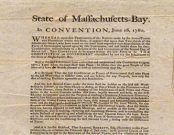Fedlandia
Among the intriguing AdLaw cases on the Supreme Court’s docket is U.S. Army Corps of Engineers v. Hawkes. The Hawkes own some land 120 miles from the nearest navigable river, where they want to dig up peat moss. The feds think that this land is their land, or water. In any event, no. To figure out whether this or that parcel is actually water and thus subject to the feds’ jurisdiction under the Clean Water Act the Corps has created a process called a “Jurisdictional Determination” (“JD”), which involves expensive (for the enforcement target) fact-finding and then adjudication before an administrative body.
Suppose that body says, “it’s water”: is that a “final” agency action that you can challenge in an ordinary court? The Hawkes say yes; the feds say no. The JD, they say, is just our opinion—a bit of helpful advice to concerned citizens. Said citizens can still go ahead and file for a permit, to determine in that yet more expensive process whether they actually need a permit in the first place. Or, they can go ahead with their projects—except if it then turns out that they did need a permit, they may owe huge fines (up to $37,500 per day), or go to jail.
The legal answer here is pretty easy (sure it’s final agency action) but there’s a deeper problem, which came out in the oral argument. On the one hand, federal agencies issue opinions and advice all the time—and presumably we want it that way. If all of that helpful guidance were reviewable, agencies would keep mum and then hammer us. That wouldn’t be good. On the other hand (Chief Justice Roberts noted), agencies—especially including the Corps—can and do use such instruments strategically, to exercise jurisdiction they don’t actually have. That’s not good, either. So what the Court is actually looking for in all the mumbo-jumbo over the precise contours of “final” agency action is a rule that minimizes the joint costs of error on either side.
That rule, I’m afraid, doesn’t exist. What you’d need is a government without empire-building incentives; or a Congress or a Court that limits the government’s jurisdiction, not just the process; or some mechanism to hold the government and its agents financially responsible for the losses they inflict in transgressing their jurisdiction. We don’t have any of that. And so: legally, reviewability provides some backstop. Practically speaking, it’s a sideshow. I can prove it:
Hawkes is a replay of Sackett v. EPA, another wetlands case involving an EPA “compliance order” rather than a JD. Is that a final, reviewable order? Yes, said the Supremes, 9-0. The Sacketts received the EPA’s order in 2007. The Court’s decision was rendered in 2012. And where are the Sacketts now? In district court, last I looked—litigating with the feds. When will they ever get to build their home on their supposed “wetland”?
That question, at least, has an answer: never.



